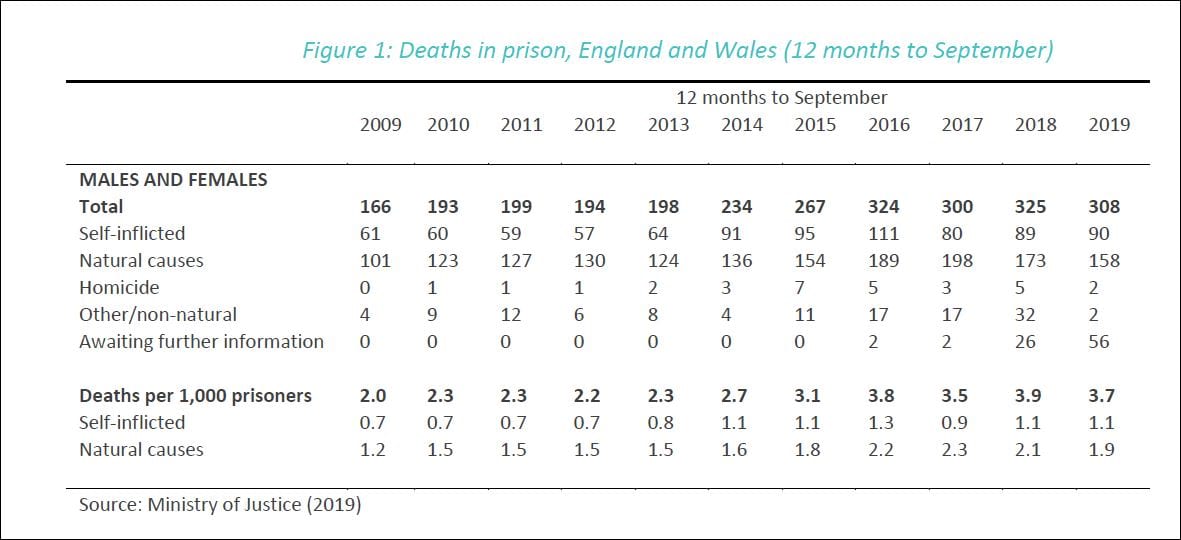On Wednesday (22 January 2020) INQUEST published a report exposing dangerous, longstanding failures across the prison estate and historically high levels of deaths in custody. Deaths in prison: A national scandal offers unique insight and analysis into findings from 61 prison inquests in England and Wales in 2018 and 2019.
The report details repeated safety failures including mental and physical healthcare, communication systems, emergency responses, and drugs and medication. It also looks at the wider statistics and historic context, showing the repetitive and persistent nature of such failings.
Every four days a person takes their life in prison, and rising numbers of ‘natural’ and unclassified deaths are too often found to relate to serious failures in healthcare. The lack of government action on official recommendations is leading to preventable deaths. With case studies of deaths and inquest findings, the report tells the harrowing human stories behind the statistics. INQUEST also details the experiences of bereaved families who struggle to access minimal legal aid for inquests, while prisons automatically receive millions in public funding.
The report sets out recommendations to improve safety and prevent future deaths including:
- a new national oversight mechanism, to monitor and enforce the implementation of recommendations from investigations, inquests and inquiries on state related deaths,
- significantly reducing the prison population,
- reallocating resources from criminal justice to community-based health and welfare services.
The human stories behind the statistics
Official statistics provide useful quantitative information on trends yet the human stories behind the statistics are largely hidden from view. INQUEST works so that families are able to have meaningful participation in post death investigations. Inquests themselves can influence the level of scrutiny and help to shine a light behind the closed walls of the prison. The work of INQUEST and the families its supports has been crucial to uncovering procedural and systemic failings of prison and healthcare providers.
Brief details of two tragic cases reproduced from the report below.
Jordan Hullock was just 19 when he died of meningitis and a pre-existing heart condition. The inquest heard that Jordan was left to deteriorate in appalling conditions in full view of staff. His inquest found his death was due to ‘natural causes’ with serious failures and shortcomings in care during his time at HMP Doncaster. At the conclusion of his inquest in July 2019, his mother Marie commented:
“Four years on we are still devastated and angry that we have lost our loving son. We have persisted with this battle to try to get some answers and justice, not only for Jordan losing his life, but for the days and days of suffering he endured whilst he was ridiculously poorly in HMP Doncaster.”
Shane Stroughton was an IPP sentenced (Imprisonment for Public Protection) prisoner who died a self-inflicted death in HMP Nottingham in 2017. The inquest in June 2019 found multiple failures, including inadequate care and support from mental health services. Following the inquest, Shane’s mother Deborah, said:
“So much went wrong in Shane’s case. The IPP was vicious. He had a 2 ½ year term but did 10, and it made his mental health problems worse and also institutionalised him. He could not cope with freedom and so was recalled quickly. Nottingham was a terrible prison for him. With all that was going on there they were never going to notice a quiet boy like my Shane. So they did not notice him losing two stones of weight. And taking his TV from him at the same time as removing support and losing his cell mate was just cruel.”
Conclusion
INQUEST includes a summary of everyone of 61 prison inquests in England and Wales in 2018 and 2019 which makes for some very grim reading.
Even more upsetting are two of INQUEST’s main conclusions from their work:
- Neglect, a lack of care and a culture of disbelief towards prisoners experiencing health problems and mental ill health, is a disturbing feature of our casework. Prisoners have very little autonomy or control and are completely dependent on prison and healthcare staff for their treatment and care. This puts them in a uniquely vulnerable position.
- Prisoners are too regularly neglected because of failures to respond to mental health crises and medical emergencies. People are ignored because it is presumed they are faking it, or it is ‘just’ a mental health problem. Budget cuts within prisons have led to a worsening of conditions, and an intensification of existing dangers to people in prison.
We must hope that this government which has already introduced measures to increase our prison population is prepared to invest properly in our prisons to reverse this dreadful trend of an increasing number of people needlessly dying in our prisons.







